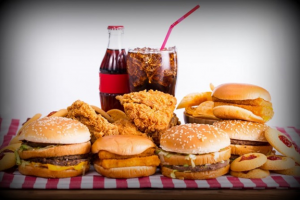by Rachael Otto
Who wants a baconator?!
It is loaded with cheese and lots of bacon! Get a combo with a large coca cola and large fries!
Whenever I watch TV, there is always a commercial by McDonalds, Burger King, Wendy’s, etc. The advertisements are designed to appeal to the people to purchase from either one of these fast food restaurants. I personally, have had moments when I had craved Burger King fries. I would eat it, and be consumed with guilt afterwards, since I strive to eat healthy.
Community social psychology concentrates on the progress and wellness of a community. A community that concentrates on its members’ wellbeing enables the community to thrive, collectively. The progress of a community essentially depends on the values within the community. Every member of the community can promote their personal wellness.
The fast food restaurants earn billions of dollars each year. The owners of the restaurants are wealthy individuals whose personal growth can arguably relate to gaining successful fast food restaurants, and enormous wealth. However, their personal growth, in relation to the money they earn comes at the expense of another group, in the community. There are members in the community that are unable to purchase healthy foods due to the cost, and based on their socioeconomic status. Fast food restaurants are inexpensive and easily accessible. Arguably, impoverished members within a community are likely to purchase fast food due to the inexpensive cost. Purchasing fresh and healthy food can be expensive that members of an impoverished communities are not able to purchase.
The influence on an individual within a group also impacts the whole group. Personal, collective and relational wellness are endorsed by values such as health, self-determination, personal growth, etc. (Prilleltensky, 2001). He asserts that these values not only profit the individual but all members of the community, proving that individual wellness impacts the community wellness. The fast food restaurants in the U.S and in other countries as well, have become a billion-dollar food industry. Per data of food chain revenues in 2014, McDonalds gained $35.4 billion, Starbucks with $12.7 billion, Subway with $11.9 billion and Burger King with $8.6 billion (Roach & Schlossberg, 2015).
A community that business owners of fast food restaurants benefit high sums of revenue, does not consider the health needs of members within the community of lower income. Fast food might contain unhealthy ingredients that can lead to diseases such as diabetes, heart diseases and cancer. Many children suffer from obesity due to the fast food they are fed, like burgers. The values relating to the personal and collective wellness of a community resonates with this issue. The personal wellness connects to the community collective wellness. If fast food companies continue to thrive selling unhealthy foods, then the health of members within the community diminishes, as diseases spread and people lose their lives. People of lower socioeconomic status, when faced with diseases, struggle to handle medical cost, and possibly lead to their deaths within the community. Due to the billion-dollar revenues, the likelihood of fast food restaurants closing may not be feasible. People dying within the community would impact the business, decreasing revenues. The community would not be a healthy community.
The wealth of the individuals that own the restaurants could afford healthy and nutritious meals, and flourish in wealth, but at the expense of the health of lower income members within the community. This evidently proves that individual cannot achieve wellness without the community wellness as well. People of higher socioeconomic status, need to comprehend that the health of all members in the community need to be prioritized.
#uml #commpsych
References
Hah, K. (2016). Fast Foodies May Be Exposed To Highly ‘Toxic,’ Potentially ‘Cancer-Causing’ Chemicals, New Fast Food Study Reveals. Retrieved February 21, 2017, from http://www.inquisitr.com/2993541/fast-foodies-may-be-exposed-to-highly-toxic-potentially-cancer-causing-chemicals-new-fast-food-study-reveals/
Prilleltensky. I. (2001). Value-Based Praxis in Community Psychology: Moving Toward Social Justice and Social Action, 29, 747-778.
Roach, D. R., & Schlossberg, M. (2015). The 20 fast food chains that rake in the most money. Retrieved February 21, 2017, from http://www.businessinsider.com/the-20-fast-food-chains-that-rake-in-the-most-money-2015-8

